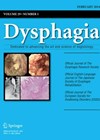
Journal Reviews archive for 2024
Pharyngoplasty for palatal snoring
This prospective Belgian study looked at the benefits of barbed reposition pharyngoplasty in the management of patients with isolated unilevel palatal snoring. This technique involves using a barbed suture and repositioning the palatopharyngeal muscle in a more lateral and anterior...
How common is oropharyngeal dysphagia amongst the adult population?
It is well known that oropharyngeal dysphagia (OD) is a symptom arising from many different aetiologies or disease conditions and that it is a significant morbidity affecting people’s quality of life. Establishing the prevalence of OD is complicated by the...
Acute mastoiditis pre- and post-Covid-19 pandemic
This retrospective single centre study evaluated the influence of non-pharmaceutical interventions (NPI) like use of face masks, hand hygiene, and contact restrictions on the incidence and severity of acute mastoiditis during the Covid-19 pandemic. The study collected data of acute...
Neonatal nasal stenosis - conservative approach
The authors retrospectively evaluated the efficacy of heated humidified high-flow nasal cannula (HFNC) in neonates with nasal stenosis for this study. Of the six infants included in the study, five had congenital pyriform aperture stenosis. Three of these five also...
The right ear advantage in noise
Relatively little is known about the right ear advantage, particularly in noise. The speech-in-noise performances were assessed in a group of 37 participants with normal hearing via a Matrix Test. Participants were tested binaurally, in a right-ear condition and a...
Ageing Ears
How do our ears show our age? We are all aware of the concept of presbycusis and a plethora of other events that impact our hearing over the passage of time. We are familiar with the standard subjective testing, though...
What type of sensitivity?
It is true that the different types of decreased sound tolerance conditions are, in general, poorly defined and the lines between them blurry. Hyperacusis? Loudness recruitment? Misophonia? Phonophobia? Sensory overload in noise? This paper aims to provide reference data for...
Person-centred care, enhancing audiology student understanding across the globe
Over 200 students registered for a multinational virtual event facilitated by the Ida Institute. The aim was to determine levels of student understanding and approaches to person-centred care (PCC), alongside the opportunity to evaluate the benefits of this approach to...
Strengthen your communication: better conversations can reduce the risk of frailty
Our population is ageing and, with this, the incidence of frailty is increasing. Frailty is defined as increased vulnerability to stressors resulting in adverse outcomes. Stressors can include communication and swallowing difficulties, yet these are poorly recognised. Management of communication...
A comparison between biologic and surgical treatment (FESS) for chronic rhinosinusitis with polyposis
In recent years, it is being increasingly recognised that chronic rhinosinusitis with nasal polyps (CRSwP) is a type 2 chronic inflammation based on IL-4 and IL-13, and the novel monoclonal antibody, such as dupilumab, is likely to have a major...
Postoperative ultrasound surveillance in patients undergoing hemithyroidectomy
Hemithyroidectomy, as opposed to total thyroidectomy with radioiodine remnant ablation, is now increasingly undertaken for low-risk, differentiated thyroid cancer. If on histology, this proves ‘high risk’, completion thyroidectomy is done fairly soon. In this retrospective study, a total of 105...
Hearing preservation in cochlear implantation – an American cocktail
There has been an increase in hearing preservation cochlear implant (HPCI) surgery over the last decade. Both steroid and L-N-acetylcysteine (NAC) were used and investigated respectively in the past in HPCI surgery. Authors investigated the role of perioperative NAC and...














